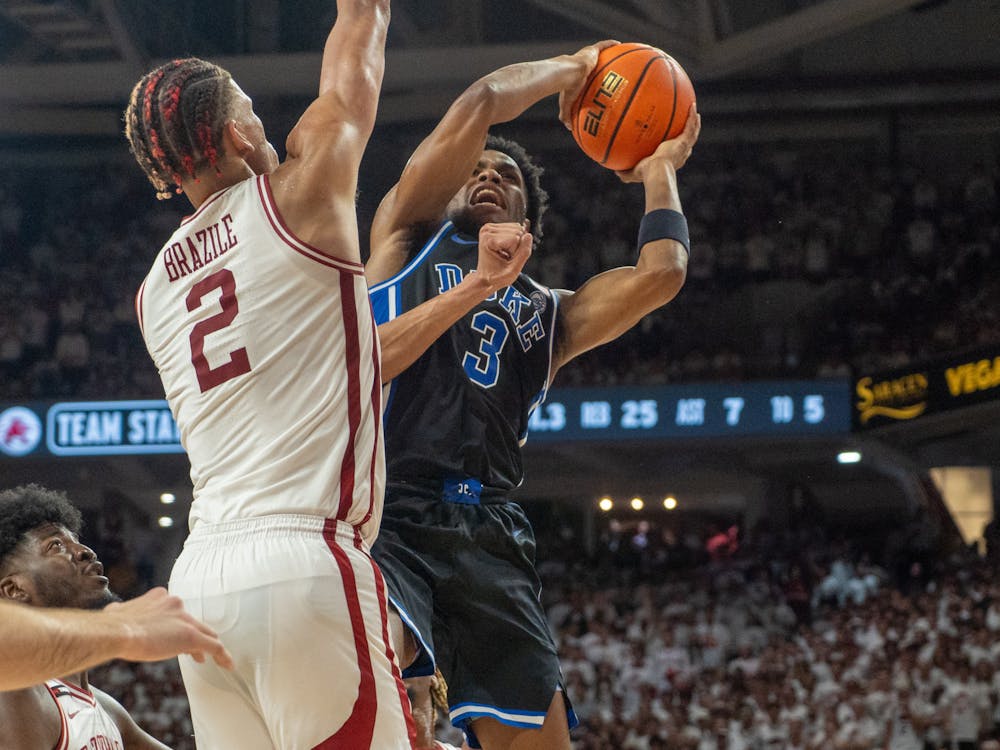Watching Duke fall to Arkansas Wednesday night felt an awful lot like watching it lose to Tennessee in March’s NCAA tournament.
The loss to the Volunteers in the Round of 32 last season was supposed to mean a lot in developing the prevailing philosophy of this year’s Blue Devil squad. It was supposed to inspire a toughness that would prevent Duke from getting “bullied” by bigger and more physical teams. It was supposed to teach the Blue Devils what is required to play winning basketball outside of the ACC. It was supposed to be the taunting loss that inspired a season of victories in head coach Jon Scheyer’s second year at the helm.
So far, it has just remained a brutal loss.
Seven out of The Chronicle’s eight men’s basketball beats, including myself, predicted a Duke win Wednesday night. This was largely because Arkansas had endured a rocky few games leading up to the ACC/SEC Challenge, so we assumed the strength and depth of Duke’s backcourt would shine through and Scheyer’s defensive identity would present the Razorbacks their strongest defensive challenge of the season.
But none of those things made a difference on the court in Bud Walton Arena. Instead, it was Arkansas who outplayed Duke, earning a tough 80-75 victory in a show of strength too imposing for the Blue Devils to overcome.
Duke optimists might purport this road loss as a hiccup in the early part of a season that has plenty of time to turn itself around and become a successful one. Maybe that’s true — maybe it was just an unfortunate midweek road game in one of the country’s toughest environments.
Or maybe Duke is, in its current form, far from contending with the wide world of college basketball that exists away from the Atlantic coast.
That’s certainly what Wednesday looked like, as the smaller Blue Devils fought to play effective defense against the tall and powerful Razorback roster whose passes flew around the court like cannon balls on Scheyer’s new zone defense design. On top of slick ball movement, Arkansas had little trouble getting shots to fall against Duke’s defensive efforts. The Razorbacks landed 49.1% of their field goals and an impressive 40.9% of their 3-pointers, which totaled 27 of their 80 total points. Only 11 of those came from fast-breaks, indicating how the team carried out head coach Eric Musselman’s game plan with precision and consistency — two elements that, together, gave the No. 7 team in the country a run for its money.
On the other end of the court, Duke struggled with offensive production just as much as it did with defense. Getting around the Razorbacks proved difficult and the Blue Devils played a worrying number of possessions without finishing them off with points. Threes were the worst of it, where the Blue Devils landed just 27.3% of their attempts. As our Rachael Kaplan wrote in her recap of the game: “From the 1:01 mark in the first half to 16:43 in the second, Duke didn’t score.”
Despite senior captain Jeremy Roach’s claims at October’s ACC Tipoff that he would “put [Duke’s backcourt] up against anybody,” the foursome of highly anticipated guards (Roach, Tyrese Proctor, Jared McCain and Caleb Foster) failed to follow through on enough production to break the home team’s man-to-man defensive play. Put simply, they got out-toughed.
Something similar happened against Arizona, another non-conference team that’s bigger and badder than Duke. The Wildcats didn’t hold the same unwavering lead the Razorbacks did for much of Wednesday’s game, but they dominated the majority of the Nov. 10 matchup at Cameron Indoor Stadium, making the Blue Devils play catch-up until time ran out.
The losses to Arizona, and especially to Arkansas, present a concerning trend for the Blue Devils: Duke struggles to overcome foes outside its conference. Scheyer made waves by winning the ACC tournament in his first year at the helm of the program, so it seemed perhaps unexpected when his team couldn’t push past the second round of March Madness and was, in Kyle Filipowski’s words from the team’s preseason media day, “punked.” But maybe it shouldn’t have been so unexpected — maybe ACC basketball is not all it used to be.
Conference play kicks off for Duke Saturday against Georgia Tech, and I’m not all that concerned about its chances. I do not fear that the team’s youth or any lack of talent will hold it back against the 14 ACC teams that it has proved itself, for over four decades under former head coach Mike Krzyzewski and for a year under Scheyer, capable of defeating. Maybe my confidence for the Blue Devils in conference play is similar to their own reason for confidence, which is simple familiarity. It’s much easier to take on teams you’ve been battling since 1953 — when the ACC was founded — than it is to meet strangers with tricks you have yet to figure out hiding under their sleeves.
To be clear, there’s plenty of time for this season to be the one the Blue Devils want it to be. But unless Duke figures out how to get around this thing that has made Tennessee, Arizona, Arkansas and other non-conference teams so hard to beat, I’m not sure I’ll be so confident about its prospects when an NCAA tournament exit is on the line.
Get The Chronicle straight to your inbox
Signup for our weekly newsletter. Cancel at any time.

Sophie Levenson is a Trinity sophomore and a sports managing editor of The Chronicle's 120th volume.

